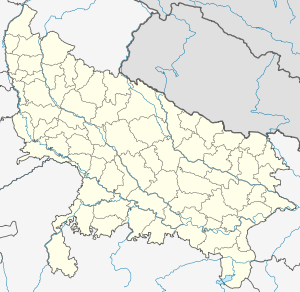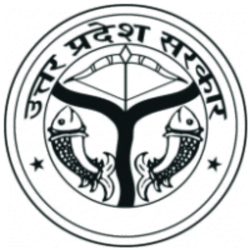Government of Uttar Pradesh
| Government of Uttar Pradesh | ||
|---|---|---|
| state | ||
| ||
| Nickname(s): Land of the Ganges and Yamuna | ||
 | ||
| Country |
| |
| State | Uttar Pradesh | |
| Region | Awadh, Braj, Bundelkhand, Purvanchal, RohilKhand | |
| High Court | Allahabad High Court | |
| District Courts India | undefined | |
| Uttar Pradesh | 14 November 18342 | |
| Capital | Lucknow | |
| Government | ||
| • Governor | Ram Naik | |
| • Chief Minister | Akhilesh Yadav | |
| • Chief Secretary | Alok Ranjan | |
| Area | ||
| • Total | 243,286 km2 (93,933 sq mi) | |
| Area rank | 5th | |
| Population [1] | ||
| • Total | 193,977,000 | |
| • Rank | 1st | |
| • Density | 792/km2 (2,050/sq mi) | |
| Languages | ||
| • Official | Hindi, Urdu | |
| Time zone | IST (UTC+5:30) | |
| ISO 3166 code | IN-UP | |
| Vehicle registration | UP XX XXXX | |
| No. of districts | 751 | |
| Largest metro | Kanpur | |
| Sex ratio | 111.4 ♂/♀ | |
| HDI |
0.490 | |
| HDI Rank | 25th | |
| HDI Year | 2005 | |
| HDI Category | low | |
| Climate | Cfa (Köppen) | |
| Avg. annual temperature | 31 °C (88 °F) | |
| Avg. summer temperature | 46 °C (115 °F) | |
| Avg. winter temperature | 6 °C (43 °F) | |
| Website |
www | |
|
1 The decision to possibly create additional districts is pending. - 9 November 2000 : Uttaranchal, now known as Uttarakhand, state created from part of Uttar Pradesh. | ||
The Government of Uttar Pradesh is a democratically elected State Government in India with the Governor as its appointed constitutional Head of the State by the President of India. The Governor of Uttar Pradesh is appointed for a period of five years and appoints the Chief Minister and his council of ministers, who are vested with legislative powers as well as executive powers of the State. The governor remains a ceremonial head of the state, while the Chief Minister and his council are responsible for day-to-day government functions. Government of UP's influence on Indian Politics is paramount as it send the largest number of Lok Sabha seats to Indian Parliament.
Administrative divisions
The Indian state of Uttar Pradesh is made up of 75 administrative districts, that are grouped into 18 divisions as of 2012.
Legislature
Uttar Pradesh is one of only seven states in India with a bicameral legislature—i.e., has two houses, the Vidhan Sabha, a legislative assembly, and the Vidhan Parishad, a legislative council. There are 403 seats in the Uttar Pradesh Legislative Assembly and 100 seats in the Uttar Pradesh Legislative Council.
Ministry
The government is headed by the Governor who appoints the Chief Minister and his council of ministers. The Governor is appointed for a period of five years and acts as the constitutional head of the State. Even though the governor remains the ceremonial head of the state, the day-to-day running of the government is taken care of by the Chief Minister and his council of ministers in whom a great deal of legislative powers is vested.
The Secretariat headed by the secretary to the governor assists the council of ministers. The council of ministers consists of cabinet Ministers, ministers of state and deputy ministers. The chief minister is also assisted by the Chief Secretary, who is the head of the administrative services.
Bureaucrats
District Magistrates/ Collectors are appointed as the main officers to look after each district for general administration.
Judiciary
There is a High Court at Allahabad and its bench is at Lucknow and courts in every district centre and Tehsils centre.
Executive
A district of an Indian state is an administrative geographical unit, headed by a Deputy Commissioner or District Magistrate, an officer belonging to the Indian Administrative Service. The district magistrate or the deputy commissioner is assisted by a number of officers belonging to Uttar Pradesh Civil Service and other state services.
A Deputy Commissioner of Police, an officer belonging to the Indian Police Service is entrusted with the responsibility of maintaining law and order and related issues of the district. He is assisted by the officers of the Uttar Pradesh Police Service and other Uttar Pradesh Police officials. A Deputy Conservator of Forests, an officer belonging to the Indian Forest Service is responsible for managing the forests, the environment, and wildlife-related issues of the district with the assistance of the Uttar Pradesh Forest Service. Sectoral development is looked after by the district head of each development department such as PWD, Health, Education, Agriculture, animal husbandry, etc. These officers belong to the various State Services.
Politics
Uttar Pradesh politics is dominated by the regional parties Samajwadi Party (SP) and Bahujan Samaj Party (BSP) , with the Bharatiya Janata Party (BJP) as the third major party. The Samajawadi Party occupies the current government headed by Chief Minister Akhilesh Yadav, son of Shri. Mulayam Singh Yadav an incumbent Lok Sabha MP from Azamgarh parliamentary constituency in U.P and a former Defence Minister of India as well as a former three time Chief Minister of Uttar Pradesh.
Schemes/Projects
Kanpur Flyovers and Roads Development Corporation(KFRDC)
There is an urgent need to develop a corporation named KFRDC f≤
or better road transport systems in Kanpur city. The roads of Kanpur do not match to any other metropolitan cities of India like Pune, Jaipur, Ahmedabad etc.Roads of Lucknow are already in good condition but Kanpur roads are in very bad condition. Surprisingly there are no flyovers in Kanpur except overbridges. On the other hand, Lucknow has many flyovers. Government should do something regarding forming this company if it wants good results from Kanpur in 2017 elections.
Free laptop distribution scheme
The Free laptop distribution scheme of Uttar Pradesh Government was the scheme of the Government of Uttar Pradesh headed by Akhilesh Yadav of Samajwadi Party.[5] 1.5 million laptops were distributed via the scheme.[6] If up government educate student about computer knowledge then laptop will be useful.
Lucknow Metro
The Lucknow Metro (Hindi: लखनऊ मेट्रो; Urdu: لکھنؤ میٹرو) is an under construction rapid transit system in the city of Lucknow, India. Construction on the first phase began on 27 September 2014. Lucknow Metro Rail Corporation Limited (LMRC) is responsible to build and operate this network.[7] The metro project will be the most expensive public transport system in the state of Uttar Pradesh, costing ₹12,500 crore (US$2 billion). It will provide speedy mass transport and help in reduce traffic congestion on city roads.
The proposed metro rail network was planned to consist of two corridors: North-South and East-West one from Amausi to Munshi Pulia and other from Vasant Kunj to Charbagh Railway Station. Both lines will intersect at Charbagh. An extension line from Indira Nagar – Gomti Nagar – Polytechnic Crossing will extend it to Patrakarpuram, Gomti Nagar.[8] The difference between arrival time of trains at each station is expected to be 7 minutes. This would be reduced to 5 minutes and then to 3 minutes in phases.
Greater Noida Metro System[9] A new metro rail network will shortly be developed between Noida and Greater Noida. Measuring 29.707 km, it will be developed at an estimated cost of Rs 5,064 crore. The Detailed Project Report (DPR) has already been prepared by Delhi Metro Rail Corporation.
According to the DPR, 22 stations are proposed, of which 13 will be constructed on ground while seven stations will be elevated. Two stations at Knowledge Park-I and sector Delta-1 in Greater Noida are planned for future expansion.
Starting from Noida City Centre in Sector 32, the proposed Metro corridor will lead towards Greater Noida via stations in Sectors 50, 51, 78, 101, 81, on the Dadri road, 83, 85, 137, 142, 143, 144, 147, 153 & Sector 149 in Noida.
It will enter Greater Noida through Knowledge Park-II and traverse Pari Chowk, Sector-Alpha 1 and 2, before terminating at Depot station proposed near recreational green, Knowledge Park-IV in Greater Noida. The entire Metro alignment is proposed to be elevated.
A special purpose vehicle (SPV) would be formed for the development, operation and maintenance of the metro rail. The Uttar Pradesh cabinet has approved the Project and forwarded the DPR to Government of India in October 2013.
The Government of India and UP will each bear 20% of the costs and loans from external agencies would be taken to fund the rest 60% of the project. Twenty per cent funding from UP will be shared by Noida and Greater Noida Authorities, based on the length of track that passes through the two areas.
The metro link is expected to be commissioned by 2017.
Expansion of Metro Rail Project (Second Phase) in Ghaziabad. The Uttar Pradesh Cabinet gave its approval to the proposed memorandum of understanding (MoU) between Delhi Metro and Ghaziabad Development Authority (GDA) for the project. With the expansion of the metro rail service from Delhi to Ghaziabad, commuting up to Delhi railway station and other important places would become easy for the people.
Ban on Polythene
On 18 December 2015 the Government following earlier Allahabad High Court orders,[10][11] banned usage of polythene in any form, failure to which it would attract penalty up to ₹5 lakh (US$7,400) fine and six months jail,[12][13][14] in accordance with Environment Protection Act, 1986.
See also
References
- ↑ "Population estimate". geoHive.com. 2008-07-01. Retrieved 2008-08-15.
- ↑ Cahoon, Ben (2000). "Provinces of British India". WorldStatesmen.org. Retrieved 2009-09-21.
- ↑ "Governors of Uttar Pradesh". Upgov.nic.in. Retrieved 2009-09-21.
- ↑ Ben Cahoon. "Indian states since 1947". Worldstatesmen.org. Retrieved 2009-09-21.
- ↑ Laptop Tablet Distribution Scheme
- ↑ Laptop distribution comes to an end in UP
- ↑ "Work on Metro project initiated". The Times of India. 6 March 2008.
- ↑ "Lucknow gets projects worth Rs 2400cr". The Times of India. 6 February 2009. Retrieved 2009-07-01.
- ↑ Greater Noida Industrial Development Authority
- ↑ "HC asks govt to impose ban on plastic bags across UP". The Indian Express. 14 December 2012.
- ↑ "सरकार हर हाल में पालिथीन बैग बैन की अधिसूचना जारी करे: हाईकोर्ट". Dainik Bhaskar. 18 November 2015. zero width joiner character in
|title=at position 22 (help) - ↑ "बड़ी खबर: यूपी में पॉलीथीन के इस्तेमाल पर रोक". Amar Ujala. 18 December 2015.
- ↑ "UP govt bans use of plastic bags across the state". Network 18. 18 December 2015.
- ↑ "UP govt bans use of polythene bags in state". Hindustan Times. 19 December 2015.
